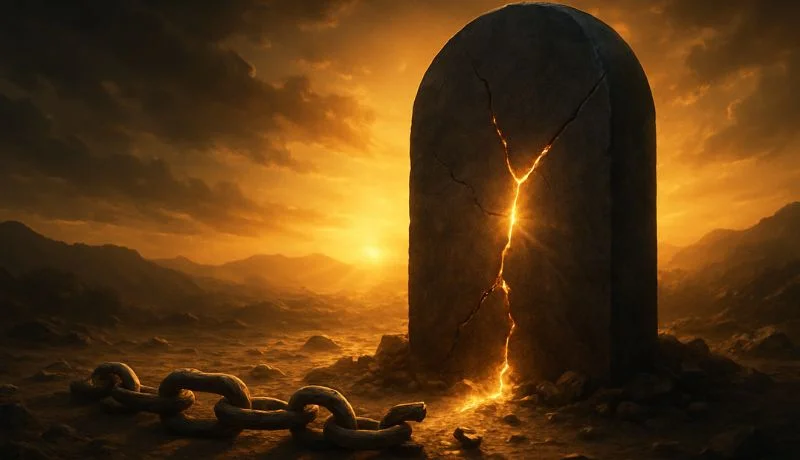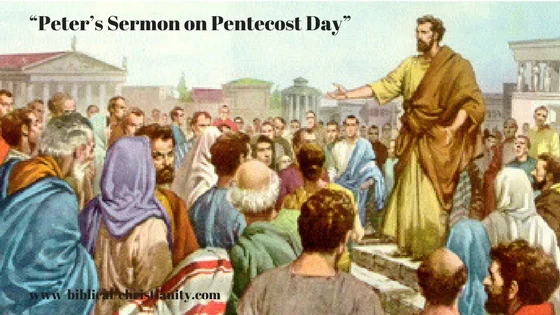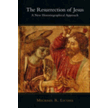
Updated: April 19, 2025
What if everything you believe about Jesus turned out to be a lie?
Imagine living your entire life believing in a Savior—only to discover He never rose from the dead. That’s the sobering implication if the resurrection of Jesus Christ never happened
Without it, our faith collapses. Christianity becomes just another religion built on good morals and wishful thinking.
But here’s the hope we cling to—He is risen, just as He said! (Matthew 28:6)
As we celebrate Resurrection Sunday, we’re reminded that the resurrection of Jesus isn’t just a feel-good tradition or a symbolic religious holiday. It’s the very foundation of our Christian faith. It confirms Jesus as the Son of God, validates every promise God made, and assures us that sin, death, and the grave have been defeated.
In this post, we’ll explore what Scripture says about the resurrection, why it absolutely matters, and what it means for us today as followers of the Risen Christ.
Evidence for the Resurrection
Before discussing the evidence for Jesus’ resurrection, we must first establish that He truly died. After all, there can be no resurrection without death. If Jesus never really died, the entire claim collapses.
Jesus’ Death: A Historical and Medical Certainty
The Gospel accounts confirm that Jesus endured brutal scourging and crucifixion at the hands of Roman soldiers—men well-trained in the art of execution (Mark 15:15–25; John 19:1–18).
Roman law demanded that soldiers ensure death had occurred, or they would face the penalty themselves (John 19:31–34). When the soldiers saw Jesus was already dead, they pierced His side, and blood and water flowed out—a clear sign of death, confirmed even by modern medical understanding as indicative of fluid buildup around the heart and lungs.
Historical sources outside the Bible also affirm Jesus’ death. Roman historian Tacitus and Jewish historian Josephus both record that Jesus was crucified under Pontius Pilate. Furthermore, medical experts who’ve studied the crucifixion, such as those cited in the Journal of the American Medical Association, have concluded that survival would have been medically impossible.
Jesus’ death is not a matter of religious opinion—it’s a historical fact supported by eyewitness accounts and medical evidence.
A. The Empty Tomb

1️⃣ Women Witnesses to the Empty Tomb
According to all four Gospels, the first witnesses to the empty tomb were women (Matthew 28:1–8; Mark 16:1–8; Luke 24:1–3; John 20:1–2). This is a significant detail.
In first-century Jewish culture, a woman’s testimony was not considered legally valid. If the resurrection account were fabricated, women would not have been chosen as the primary witnesses. The Gospel writers had no incentive to invent this detail—unless it was true.
2️⃣ A Known Burial Site
Jesus was buried in a tomb belonging to Joseph of Arimathea, a respected member of the Jewish Sanhedrin (Mark 15:42–46; John 19:38–42).
This tomb was known publicly, meaning that anyone—friend or enemy—could have verified its contents. If Jesus’ body were still inside, it would have been easy to disprove the resurrection. But no one ever produced the body.
The disciples began proclaiming the resurrection in Jerusalem—the very city where Jesus was buried. If the tomb were still occupied, their message would have been immediately discredited.
3️⃣ The Jewish Cover-Up Confirms It
In Matthew 28:11–15, the religious leaders bribed the guards to say that the disciples stole Jesus’ body while they were sleeping. This attempted cover-up actually confirms the empty tomb. If the body were still there, there would be no need for such a story.
In short, the empty tomb is not a legend—it’s a historical reality that even Jesus’ enemies couldn’t deny.
B. The Post-Resurrection Appearances of Jesus
The New Testament records multiple appearances of Jesus after His resurrection—to individuals, small groups, and large crowds.
The apostle Paul summarizes this in 1 Corinthians 15:3-8, an early Christian creed dated within just a few years of Jesus’ death. Paul writes:
“He appeared to Cephas, then to the Twelve. After that, He appeared to more than five hundred of the brothers and sisters at the same time, most of whom are still living, though some have fallen asleep…”
This passage invites first-century readers to verify the truth by speaking to living witnesses.
Jesus appeared in various places—indoors, outdoors, in Jerusalem, in Galilee. He ate with the disciples (Luke 24:41–43), invited Thomas to touch His wounds (John 20:27–28), and restored Peter after his denial (John 21:15–17). These were not hallucinations. Hallucinations don’t eat fish or invite physical examination.
The sheer number and variety of these appearances make the resurrection the best explanation.
| # | Appearance | Reference |
|---|---|---|
| 1 | To Mary Magdalene | John 20:11–18 |
| 2 | To the women at the tomb | Matthew 28:8–10 |
| 3 | To two disciples on the road to Emmaus | Luke 24:13–35 |
| 4 | To Peter in Jerusalem | Luke 24:34 |
| 5 | To the disciples without Thomas | John 20:19–23 |
| 6 | To the disciples with Thomas | John 20:24–29 |
| 7 | To seven disciples by the Sea of Galilee | John 21:1–14 |
| 8 | To more than 500 at once | 1 Corinthians 15:6 |
| 9 | To James (His brother) | 1 Corinthians 15:7 |
| 10 | To the disciples at His ascension | Acts 1:3–9 |
C. The Transformation of Jesus’ Followers
1️⃣ From Cowards to Courageous Witnesses
After Jesus’ arrest, the disciples scattered. Peter, His most vocal supporter, denied Him three times (Matthew 26:69–75). But after seeing the risen Christ, these same disciples boldly proclaimed the resurrection—at great personal cost (Acts 2:22–24, 32; Acts 4:13–20). Many were imprisoned, tortured, and martyred.
People may die for a lie they believe to be true, but no one dies for what they know is a lie. The disciples were utterly convinced they had seen the risen Lord.
2️⃣ The Conversion of Skeptics and Enemies
James, the brother of Jesus, once doubted His divinity (John 7:5), but later became the leader of the Jerusalem church and died a martyr’s death (Acts 15:13; Galatians 1:19). What changed? He saw his risen brother (1 Corinthians 15:7).
Then there’s Saul of Tarsus—a zealous Pharisee and fierce enemy of Christianity. Yet after encountering the risen Christ on the road to Damascus (Acts 9:1–9), he became the apostle Paul, enduring beatings, imprisonment, and ultimately execution for preaching the Gospel.
Only a real resurrection could explain such radical transformations.
D. The Birth and Endurance of the Christian Church
How did a small group of frightened disciples become bold proclaimers of a risen Messiah? Why did Christianity explode across the Roman Empire in just a few decades?
The resurrection wasn’t just an event—it was the foundation of a movement. Without it, Christianity never would have existed. Every sermon in Acts centers on the resurrection (Acts 2:32, Acts 3:15, Acts 4:10). Even under persecution, early believers gathered, prayed, and preached—not because of a philosophy, but because of a person: the living Christ.
Church history records that nearly all of the apostles were martyred for their faith. They didn’t recant. They didn’t run. They believed Jesus had conquered the grave—and they were willing to die proclaiming it.

Conclusion
If Jesus did not rise from the dead, everything we believe would crumble. Our faith would be in vain, forgiveness would remain out of reach, and death would have the final word.
But praise be to God—Jesus is alive!
The tomb is empty, and the risen Savior offers eternal life to all who trust in Him.
Josh McDowell, in Evidence That Demands a Verdict, wrote:
“The resurrection of Christ is therefore emphatically a test question upon which depends the truth or falsehood of the Christian religion. It is either the greatest miracle or the greatest delusion which history records.”
As we reflect this Resurrection Sunday, remember: our faith stands on solid ground.
Jesus—the risen Lord—walks beside us, intercedes for us, and promises to return for us.
- Because He lives, we are forgiven.
- Because He lives, we are never alone.
- Because He lives, we have an unshakable hope.
“Blessed be the God and Father of our Lord Jesus Christ! According to His great mercy, He has caused us to be born again to a living hope through the resurrection of Jesus Christ from the dead.”
— 1 Peter 1:3 (ESV)
Resurrection Sunday Reflection
As we celebrate the resurrection of Jesus Christ, let’s pause and let this powerful truth sink deep into our hearts.
He didn’t just rise to prove a point—He rose to give us life.
He didn’t just overcome death—He overcame our greatest fear.
The resurrection is more than a historical event. It is the heartbeat of our faith and the source of our daily strength. Let it move you. Let it change you. Let it send you out with courage to love, to serve, and to share this living hope.
This Resurrection Sunday, take a moment to ask:
- Am I living in the power of His resurrection?
- Does my life reflect the hope and love of the Risen Christ?
- Who can I encourage or share this good news with today?
Let’s rejoice—not just in word, but in the way we live.
This post contains affiliate links. If you click on one of the links and make a purchase, I may receive a small commission at no extra cost to you. I only recommend products I truly believe in and think will be beneficial to my readers. Thank you for supporting Biblical Christianity!
Recommended Resource:
 |
The Resurrection of Jesus: A New Historiographical Approach By Michael R. Licona The question of the historicity of Jesus’ resurrection has been repeatedly probed, investigated and debated. And the results have varied widely. Perhaps some now regard this issue as the burned-over district of New Testament scholarship, while others have come to believe that we simply do not have th adequate methods to make the controversial results of the field of any use. Could there be any new and promising approach to this problem? Yes, answers Michael Licona. And in The Resurrection of Jesus: A Historiographical Approach he convincingly points us to a significant deficiency in approaching this question: our historiographical orientation and practice. So he opens this study with an extensive consideration of historiography in general, and the particular problem of investigating claims of miracles. This alone is a valuable contribution to the ongoing struggle for methodoloical viability in historical Jesus scholarship. But then Licona carefully applies his principles and methods to the question of Jesus’ resurrection. In addition to determining and working from the most reliable sources and foundational historical evidence, Licona critically weighs the viability of others’ prominent hypotheses. His own argument is a challenging and closely argued case for the historicity of the resurrection of Jesus, the Christ. Any future approaches to dealing with this “prize puzzle” of New Testament study will need to be routed through The Resurrection of Jesus. |

When a Christian starts using complex mathematical formulas and philosophical theories to defend his belief in first century corpse reanimation-transformation (aka: resurrections)…I yawn.
I yawn because it is soooo silly.
I know for a fact that if a Muslim attempted to use these same ploys to defend the veracity of Islam’s claim that Mohammad flew to heaven on a winged horse, the very same Christians would snicker and hand-wave away these arguments without giving them a second thought, believing that these tactics are nothing more than an obvious, desperate attempt to dress up a superstition as believable reality.
Hi Gary,
Are you a Christian? Based on your email add, I would assume that you’re a Lutheran, and as far as I know, Lutherans are Christians, with Martin Luther being the founder. Am I right? Correct me if I’m wrong here, but you cannot be a Christian if you do not believe in the resurrection. And mind you, there are many scientists who are Christians. So how can a scientist be a Christian when science cannot prove the resurrection?
Here’s what IAN HUTCHINSON, a professor of nuclear science and engineering at MIT, has to say:
“Science cannot and does not disprove the resurrection. Natural science describes the normal reproducible working of the world of nature. Indeed, the key meaning of ‘nature’, as Boyle emphasized, is ‘the normal course of events.’ Miracles like the resurrection are inherently abnormal. It does not take modern science to tell us that humans don’t rise from the dead. People knew that perfectly well in the first century; just as they knew that the blind from birth don’t as adults regain their sight, or water doesn’t instantly turn into wine.”
It’s not silly telling people, including Muslims, that Jesus rose from the dead. And by the way, a former devout Muslim converted to Christianity because of the strong evidence for the Christian faith. If you know what it means for a Muslim to turn his back on Islam to embrace Christianity, you would certainly understand that the resurrection is not just some kind of ploy that Christians use in order to trick Muslims into believing that Christianity is true.
I am not an expert with regards to the resurrection and that is why I would like to refer you to those who are. You can check out the book: The Case for the Resurrection of Jesus by Gary Habermas and Michael Licona.
https://www.christianbook.com/the-case-for-the-resurrection-jesus/gary-habermas/9780825427886/pd/427886?event=PRCBD1#CBD-PD-Description
You may also want to watch this video.
https://youtu.be/ay_Db4RwZ_M
As Frank Turek said, the greatest miracle already happened in the very first chapter and verse of Genesis, so why is the resurrection a BIG DEAL? If God can create the heavens and the earth from nothing, why is it impossible for Him to become a man, die and resurrect?
God bless you Gary!
I love this blog post. Our entire existence hinges on Jesus’ life, death, and resurrection! When I started my blog, I considered doing it in the niche of religion, but figured there would be so much backlash I didn’t do it. But one of my blogs I am now considering changing to Coffee and Jesus or some variation of that because Jesus is very important to me regardless of the “bad” comments I may get. Preach on!
Hi Michelle,
You’re absolutely right; if Jesus did not live a perfect life of obedience to the Father, did not die and resurrect, life would be meaningless. How truly amazing is the love of God that He reached down to us from His throne in heaven in order to give us hope, the hope of eternal life. If Jesus did not rise from the dead, we are of all people the most to be pitied as what Paul said.
Having a platform to share about God, Jesus and Christianity has been my desire even before I knew how to build and manage a website. I just hope that more and more fellow believers in Christ will be bold enough to share the love of God through their blog, regardless of the criticisms and negative comments. “Coffee and Jesus” sounds like a cool site to share Jesus.
Thanks for your comment.
So true. I also just watched The case For Christ in my women’s life group at church. It was a good movie and one I want my husband to see because he is on the fence about things, mainly the bible. He says it is man made and how do we know over the years how much of it is still true and how much has been changed, added, or made up.
The Case for Christ book and movie are great Christian apologetic materials, considering that the author was a journalist who used to be a hard-core atheist. I was just sharing with one of my superiors who is a Muslim how the life, death and resurrection of Jesus Christ is a historical fact and cannot be denied. I added that Christianity hinges on the fact of Jesus’ resurrection, which means if you can disprove that Jesus rose from the dead then Christianity falls. I even challenged him that if he can show me enough evidence of Islam, one that is stronger than the case for Christianity, I would become a Muslim. On the other hand, if I can prove to him that Christianity is true then he must become a Christian.
Based on his response, I figured he’s not open-minded enough to look at the evidence. So I ended our conversation. I just hope I was able to plant a seed in his heart that will eventually sprout and grow.
By the way, there’s also one book that is a good material in proving that Christianity is true. It’s the book by J. Warner Wallace “Cold Case Christianity.”
Cold-Case Christianity: A Homicide Detective Investigates the Claims of the Gospels
By J. Warner Wallace
A riveting journey through Christianity using the analytical lenses of a former atheist and L.A. County homicide detective!
Christianity, with all of its claims could easily be described as a “cold-case”; a case for which insufficient hard evidence exists to make any sound conclusions about its truth claims. However, in Cold-Case Christianity, J. Warner Wallace uses his nationally acclaimed skills as a homicide detective to look at the evidence and eyewitnesses behind Christian beliefs. He includes gripping stories from his career and the visual and interrogation techniques he developed while a police officer. Along the way, he uses analogy and anecdotes to examine the powerful evidence that validates the claims of Christianity.
Cold-Case Christianity is a unique apologetic that speaks to readers’ intense interest in detective stories, and inspires readers to have confidence in Christ as it prepares them to articulate the case for Christianity.
There would be no hope for the after life. He would have been just a another man.
You mention Josh McDowel at the end. A good movie That I have watch was the evidence of The Case for Christ. It’s actually from the true story of a Chicago reporter who tried to prove that Jesu was a myth after he saw his wife becoming so attached to Him.
After all his investigation and research, he was forced to admit that, historical facts were proving not only the evidence of jesus life, but also his death and resurrection.
Our faith as Christians rely on those 3 facts: Christ life, death and resurrection.
Without these 3 elements there would be no possible living relationship with God. Just faith in a dead prophet.
That’s exactly right Guy! The salvation of mankind not only rests on the suffering and death of our Lord Jesus Christ but also on His resurrection.
I’m glad you mentioned the movie The Case for Christ. I’ve watched it too right after reading the book of the same title. I was in tears while reading the book because I could never imagine the suffering that Christ had to go through in order to pay for my sins. Although I’ve watched the movie Passion of the Christ, I never truly understood how a Roman crucifixion is done until I heard it explained in Lee Strobel’s book. It’s terrible!
Yes, the Christian faith rests on the historical facts of the suffering, death and crucifixion of Christ. If Jesus did not rise from the dead then we’re all lost and are bound to suffer in hell. But Christ rose from the dead which means He has defeated death and hell and has emerged victorious, hallelujah!